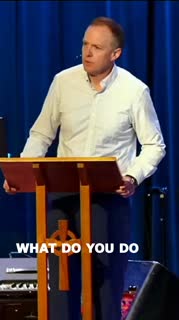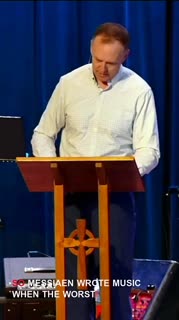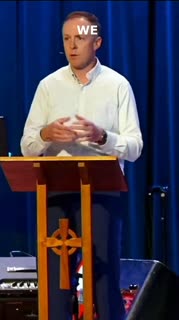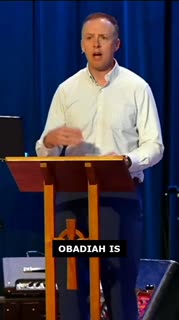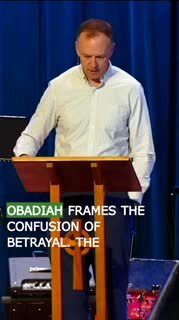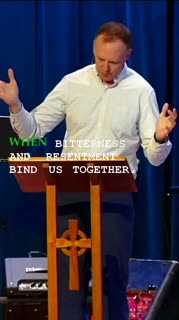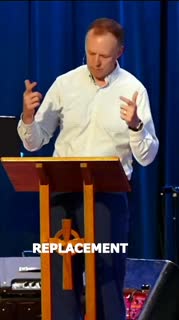From Exile to Redemption: Hope in Obadiah
Devotional
Sermon Summary
Bible Study Guide
Sermon Clips
1) "What do you do in the worst of circumstances? As I asked that, Rob has in many ways evoked some of the worst that can happen to us as we face natural disaster, as we face the evaporation of our dreams for the family that we had hoped for. In 1940, there was a young man. He was 30. He was French. And ever since he was a little kid, he loved to play one of those, a piano. And he had been trained in Paris, at the best schools. His name was Olivier Messiaen. But he found himself in the Battle of France, and that's when France lost the Germany. And before he knew it, he was in what is now Poland, in prisoner of war. Being a musician, he had done two things. One, he had held on tightly to just a few pieces of paper in the palm of his hand, some scores that he had scribbled down. And the other thing that he had done was, as he was in this camp, even as he was on the way there, he was looking for other musicians. He found three." [03:07] (71 seconds)
2) "So Messiaen wrote music when the worst thing happened. Obadiah preaches a sermon. Let's remember now how the people of God got to exile. Remember there was Abraham, Isaac, and Jacob. The promise that God gives to Abraham in Genesis 12 where he says, go from your country, your kindred, and your father's household to the land that I will show you. I will make you great. And through you all the people of the earth will be blessed. That promise becomes a people as Abraham and Sarah have Isaac. And as Abraham and Sarah have Isaac. And as Isaac and Rebekah have Esau and Jacob. And as Jacob marries Rachel. And Jacob and Rachel and Leah have twelve sons. You know this story. There's the coat of many colors. There's the sun that's sold into Egypt. There's the people that come there and grow from a people to a tribe. And those people are lost for 400 years as they become slaves. And then there's the man Moses, right? Who comes and delivers the people. He's God's man. And brings them out of Egypt. And they're in the desert for 40 years. And they're headed for the promised land. The promised land. It's the land that Abraham walked around. It's the land that his sons lived in as nomads. It's the land that those people, when they were slaves in Egypt, dreamed about." [06:02] (103 seconds)
3) "We read their story, right? We tell it to our kids on felt boards and on coloring sheets. And we hold our breath. We want it to end in a comedy where things end up better than they should be. Where the kings are good and where the people flourish. Because that's the way the life of grace is supposed to be. We so want our hero, Israel, to return to the taproot of their collective soul. And there's flashes of hope. There are people of promise. Yet Israel becomes a people who turn to violence over peace, hatred over love, abuse over justice. And the Lord hands them over to the things they want. Right? So that's, if we can think, just get that story in your mind, right? It starts with the patriarchs, Abraham, Isaac, and Jacob. And then it goes to Egypt. And then Moses takes them to the desert. And they're in the promised land. And they have all these kings. But things do not go as they should. And the Lord hands them over to the things they want." [07:29] (62 seconds)
4) "Obadiah is singing the blues. This is what, the soul is of an American creation. It comes from texts like this. He's speaking the unspeakable. He's naming the trauma of their past. He's not going to let them cut it off. He mentions misfortune and somebody says amen. He says ruin and somebody says my mind. He says calamity, calamity, calamity. Because that is... That is the best word for where these people find themselves. You can imagine tears flowing, speaking, and people saying, yes, yes, that was me. Obadiah is connecting the words of these prophets to the worst case scenario that's unfolding in these people's lives. The very things that had happened to them when their beloved Jerusalem fell. Powerful words to a powerless people." [17:36] (59 seconds)
5) "Obadiah frames the confusion of betrayal. The impulse and instinct that flows. The hurt, the pain, and he places their lives in a larger frame than their experience. The frame of the justice of God. The day of the Lord. A time when the evil deeds of the evildoers will return on their heads. When what is done by others will be done to them. On this day of the Lord, the power of violence will be limited. Not repaid two -fold or four -fold. But one -fold. An eye for an eye. A tooth for a tooth. A radical forbearance and limitation in Israel's day and in ours too. And just see. Just take a step and see what Obadiah is doing. This is where he's a prophet. And his words just kind of slap us off the page. But look what he's doing. He's a good pastor. He is trying to save his people from resentment." [20:53] (63 seconds)
6) "When bitterness and resentment bind us together. Reconciliation or constructive solidarity are impossible. Obadiah knows this. And he wants to move these people past bitter resentment into a frame of seeing that God is working for them. So next Obadiah paints a picture of what that day will look like. It will happen on the Lord's holy mountain, Jerusalem. The place where brotherly betrayal unfolded will be a place where the price is paid. So he says in verses 16. For as you have drunk on my holy mountain, so all the nations shall drink continually. They shall drink and swallow and shall be as though they had never been. And in Mount Zion there shall be those who escape and it shall be holy. And the house of Jacob shall possess their own possessions. The house of Jacob shall be a fire and the house of Joseph a flame. The house of Esau stubble. They shall burn them. They shall burn them and consume them. And there shall be no survivor for the house of Esau. For the Lord has spoken." [21:59] (69 seconds)
7) "The true great replacement theory is this. That all humanity is like Edom. It has betrayed its brother. It has chosen the way of death and destruction instead of love and humility. Humanity has betrayed God. And God has destroyed humanity. He has burned us and consumed us. And this is the great replacement. All the faithless humanity has been replaced by the one faithful man. All of Israel replaced by one faithful Israelite. The man Jesus Christ. This faithful one was sent by God who so loved the world that whoever believes in him should not perish but have eternal life. And the deep good news of Jesus is that we can be a new creation in him. The old humanity, the old Adam is gone. And the new one has come. The old self is replaced." [29:37] (59 seconds)
Ask a question about this sermon
2) "So Messiaen wrote music when the worst thing happened. Obadiah preaches a sermon. Let's remember now how the people of God got to exile. Remember there was Abraham, Isaac, and Jacob. The promise that God gives to Abraham in Genesis 12 where he says, go from your country, your kindred, and your father's household to the land that I will show you. I will make you great. And through you all the people of the earth will be blessed. That promise becomes a people as Abraham and Sarah have Isaac. And as Abraham and Sarah have Isaac. And as Isaac and Rebekah have Esau and Jacob. And as Jacob marries Rachel. And Jacob and Rachel and Leah have twelve sons. You know this story. There's the coat of many colors. There's the sun that's sold into Egypt. There's the people that come there and grow from a people to a tribe. And those people are lost for 400 years as they become slaves. And then there's the man Moses, right? Who comes and delivers the people. He's God's man. And brings them out of Egypt. And they're in the desert for 40 years. And they're headed for the promised land. The promised land. It's the land that Abraham walked around. It's the land that his sons lived in as nomads. It's the land that those people, when they were slaves in Egypt, dreamed about." [06:02] (103 seconds)
3) "We read their story, right? We tell it to our kids on felt boards and on coloring sheets. And we hold our breath. We want it to end in a comedy where things end up better than they should be. Where the kings are good and where the people flourish. Because that's the way the life of grace is supposed to be. We so want our hero, Israel, to return to the taproot of their collective soul. And there's flashes of hope. There are people of promise. Yet Israel becomes a people who turn to violence over peace, hatred over love, abuse over justice. And the Lord hands them over to the things they want. Right? So that's, if we can think, just get that story in your mind, right? It starts with the patriarchs, Abraham, Isaac, and Jacob. And then it goes to Egypt. And then Moses takes them to the desert. And they're in the promised land. And they have all these kings. But things do not go as they should. And the Lord hands them over to the things they want." [07:29] (62 seconds)
4) "Obadiah is singing the blues. This is what, the soul is of an American creation. It comes from texts like this. He's speaking the unspeakable. He's naming the trauma of their past. He's not going to let them cut it off. He mentions misfortune and somebody says amen. He says ruin and somebody says my mind. He says calamity, calamity, calamity. Because that is... That is the best word for where these people find themselves. You can imagine tears flowing, speaking, and people saying, yes, yes, that was me. Obadiah is connecting the words of these prophets to the worst case scenario that's unfolding in these people's lives. The very things that had happened to them when their beloved Jerusalem fell. Powerful words to a powerless people." [17:36] (59 seconds)
5) "Obadiah frames the confusion of betrayal. The impulse and instinct that flows. The hurt, the pain, and he places their lives in a larger frame than their experience. The frame of the justice of God. The day of the Lord. A time when the evil deeds of the evildoers will return on their heads. When what is done by others will be done to them. On this day of the Lord, the power of violence will be limited. Not repaid two -fold or four -fold. But one -fold. An eye for an eye. A tooth for a tooth. A radical forbearance and limitation in Israel's day and in ours too. And just see. Just take a step and see what Obadiah is doing. This is where he's a prophet. And his words just kind of slap us off the page. But look what he's doing. He's a good pastor. He is trying to save his people from resentment." [20:53] (63 seconds)
6) "When bitterness and resentment bind us together. Reconciliation or constructive solidarity are impossible. Obadiah knows this. And he wants to move these people past bitter resentment into a frame of seeing that God is working for them. So next Obadiah paints a picture of what that day will look like. It will happen on the Lord's holy mountain, Jerusalem. The place where brotherly betrayal unfolded will be a place where the price is paid. So he says in verses 16. For as you have drunk on my holy mountain, so all the nations shall drink continually. They shall drink and swallow and shall be as though they had never been. And in Mount Zion there shall be those who escape and it shall be holy. And the house of Jacob shall possess their own possessions. The house of Jacob shall be a fire and the house of Joseph a flame. The house of Esau stubble. They shall burn them. They shall burn them and consume them. And there shall be no survivor for the house of Esau. For the Lord has spoken." [21:59] (69 seconds)
7) "The true great replacement theory is this. That all humanity is like Edom. It has betrayed its brother. It has chosen the way of death and destruction instead of love and humility. Humanity has betrayed God. And God has destroyed humanity. He has burned us and consumed us. And this is the great replacement. All the faithless humanity has been replaced by the one faithful man. All of Israel replaced by one faithful Israelite. The man Jesus Christ. This faithful one was sent by God who so loved the world that whoever believes in him should not perish but have eternal life. And the deep good news of Jesus is that we can be a new creation in him. The old humanity, the old Adam is gone. And the new one has come. The old self is replaced." [29:37] (59 seconds)
